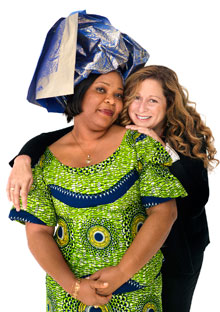The women of Liberia are proof that nonviolent and peaceful protest isn’t just a fantasy…
Pray The Devil Back To Hell

Director: Gini Reticker
Origin: Liberia
Year: 2008
Duration: 72
Starring:
-
The women literally formed a barricade around the building and didn’t allow the men to exit until a deal was bartered.
-
The women also did a sex strick to protest and stop the war even after mental & physical abuse by there husband

Leymah Gbowee‘s mission: Defy a dictator, end a war, return her native Liberia to peace. Abigail Disney’s mission:
Make a movie telling the world how it was done. Kevin Conley meets the visionary pair who reached across continents and cultures to show just how powerful women’s voices can be.
In the fall of 2006, Leymah Gbowee, a 34-year-old Liberian mother of five, came to New York City to talk to members of the United Nations Security Council about women, security, and peace. On the third day of her visit, she attended a long series of meetings at the UN, then walked back to the Hotel Bedford, five blocks away. She had one more meeting to go, and she wasn’t happy about it. A movie producer and director had asked to talk to her about a film they hoped to make, a documentary about a group of ordinary Liberian women who, if the stories were true, had managed to help stop that country’s nearly continuous 14-year civil war. (“Oh, those women,” one warlord said. “They didn’t really matter. They were only our conscience.”) Though Gbowee had agreed to sit down with the filmmakers, she assumed she’d be wasting her time. The friend who’d set up the meeting had told her that the producer, Abigail Disney, came from the movie-studio and theme-park family. “Yeah, right,” Gbowee told her friend. “Disney World? What does this mean to someone from Africa?”
Disney, who is in fact Walt Disney’s grandniece, and her friend, the director Gini Reticker, had heard intriguing but incomplete accounts of the Liberian story, the gist of which was that three years earlier, a group of women had formed a human barricade outside a meeting room where peace talks between the warring factions had broken down—and succeeded in forcing the negotiators to get serious. But none of the Liberian women the filmmakers had spoken to seemed to know the whole story, and none had the ineffable presence needed to carry a feature-length film. Disney had begun to fear that the project wouldn’t get off the ground. Reticker, meanwhile, had begun to fear that it would. Her previous movies had addressed difficult topics (including, in her 2003 Oscar°-nominated documentary short,Asylum, female genital mutilation), but this story seemed worse. “I was afraid of it,” Reticker says. “Everything you heard about what was happening in West Africa—the violence against women—was horrific.”
At the Hotel Bedford, Gbowee came downstairs to the lobby in jeans and a T-shirt. The meeting would be quick—no food, no drink, no chitchat. She sat at the head of a small table and took stock of the women sitting on either side. In recent years, she’d spoken to many journalists, yet very little about the doings of the Women in Peacebuilding Network (WIPNET), the interfaith movement of Christians and Muslims she’d helped found in 2001, had ever appeared in print, on film, or on radio. “So I’m saying to myself, ‘Okay, these two white girls want to talk,'” she remembers. “Apparently my face showed I wasn’t interested in anything they had to offer, but I tried to be nice.” She told the visitors how WIPNET had indeed played a vital role in ending the war, then excused herself and went back to her room.
And just that quickly, Disney and Reticker walked outside and started jumping up and down. “We couldn’t believe how incredible Leymah was,” Disney says. “She was (a) brilliant, (b) beautiful, (c) fierce, and (d) at the heart of a story that was even more astonishing than we’d imagined. Any doubt I had about making this movie was gone.”


There are no comments